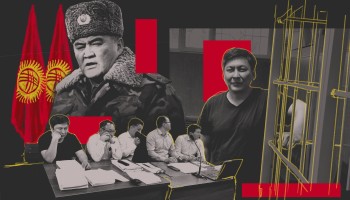After the United Nations Human Rights Office urged Kyrgyzstan to review the convictions of nine reporters under laws widely criticized as tools to suppress dissent, investigative journalist Bolot Temirov said Tuesday he is also awaiting a U.N. decision on his incarcerated wife, Makhabat Tazhibek Kyzy.
The Office of the United Nations High Commissioner for Human Rights called beginning of March on Kyrgyz authorities to “take the steps necessary to remedy the situation without delay,” including removing conditional sentences imposed on journalists and releasing one who remains in prison.
“The UN decision on the nine journalists has been published, but not on Makhabat yet. It will probably be published separately later,” Temirov, editor-in-chief of Temirov Live, said in an interview with the Organized Crime and Corruption Reporting Project (OCCRP). “According to their procedures, they sent the document to the government for review.”
Temirov Live, an OCCRP partner in Kyrgyzstan, is known for exposing high-level corruption. In January 2024, eleven of its current and former employees were arrested after police conducted a “forensic linguistic examination” of their social media posts and accused them of calling for protests. Seven were later acquitted due to a lack of evidence, while four—including Tazhibek kyzy—were convicted.
Journalists Aktilek Kaparov and Aike Beishekeeva received three-year suspended sentences, while Tazhibek kyzy, director of Temirov Live, was sentenced to six years in prison and Azamat Ishenbekov to five. All have denied the charges, claiming they are being punished for their investigative work.
The Clooney Foundation submitted a separate complaint on behalf of Tazhibek kyzy to the U.N. Working Group on Arbitrary Detention in March, arguing her detention was “arbitrary, in part because it’s based on a vague and overbroad law that criminalizes calls for active disobedience and violates freedom of expression.” The foundation’s TrialWatch initiative has also urged courts to order her release.
Press freedom advocates, including Amnesty International and Transparency International, have condemned the convictions as politically motivated. “These charges are nothing more than a politically motivated attempt to stifle free expression and punish journalists for their work,” Amnesty International said in an October statement.
Kyrgyz authorities have yet to respond to the U.N.’s latest findings, and it remains unclear whether the government will comply with the recommendations.






